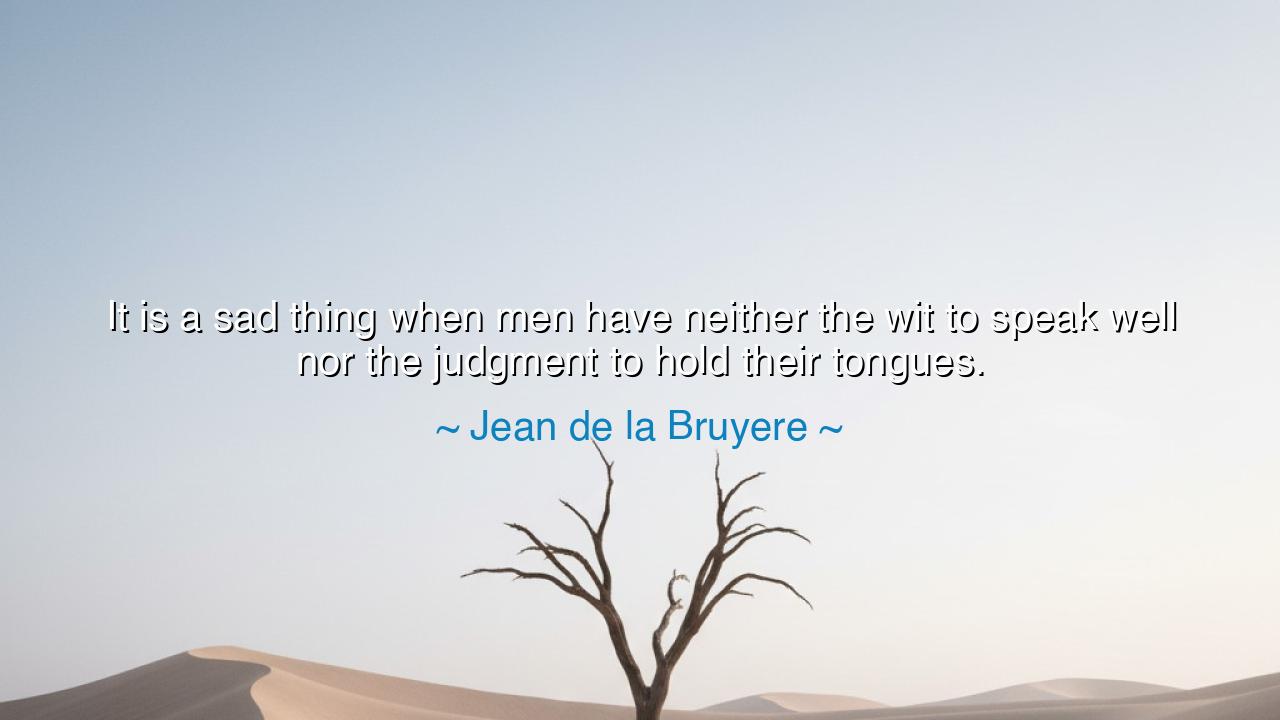
It is a sad thing when men have neither the wit to speak well nor
It is a sad thing when men have neither the wit to speak well nor the judgment to hold their tongues.






The keen observer of human nature, Jean de La Bruyère, once wrote with cutting clarity: “It is a sad thing when men have neither the wit to speak well nor the judgment to hold their tongues.” In this single sentence, the French moralist captures one of the oldest and deepest truths of civilization—that the power of speech is both a gift and a test, a mark of wisdom or of folly. For words are the bridges between souls, yet they can also be the weapons that wound them. To speak without wit—without thought, grace, or reason—is to scatter noise where silence would have been gold; but to stay silent when truth or kindness demands speech is equally a failure. Thus, La Bruyère’s lament is not only for the foolish, but for all humanity, for we live forever between the need to express and the duty to restrain.
The origin of this quote lies in La Bruyère’s great work, “Les Caractères,” published in 1688, a masterpiece of observation and reflection on the manners and morals of his time. He lived in the courtly world of seventeenth-century France—a world of eloquence, politics, and vanity, where men sought glory as much through words as through deeds. He saw how speech, when empty or reckless, revealed the poverty of the soul, and how silence, when wisely chosen, could command respect and authority. His words, though centuries old, are timeless; for the vanity of speech without substance has not vanished—it has merely found new voices in every age.
To understand La Bruyère’s wisdom, one must remember that speech was once regarded as sacred. In the ancient world, to speak was to create; the tongue could bless or curse, build or destroy. The sages of every tradition warned of its power. The Greek philosopher Socrates taught that one should test every word with three gates: Is it true? Is it kind? Is it necessary? The wise man, he said, speaks because he has something to say; the fool, because he must say something. La Bruyère echoes this same spirit. He grieves for those who lack both the art of eloquence and the discipline of silence—those who, in their ignorance, fill the air with thoughtless sound, never realizing that the world would be richer if they had simply held their peace.
Consider the example of King Lear from Shakespeare’s tragic pen. Lear’s ruin began not from silence, but from words spoken in arrogance and blindness. When his youngest daughter, Cordelia, refused to flatter him with empty praise, he mistook her truth for insolence and banished her. His other daughters, whose tongues dripped with false sweetness, deceived him—and his realm collapsed. Lear’s story is the embodiment of La Bruyère’s warning: those without the wit to speak rightly bring ruin to themselves, and those without the judgment to remain silent invite sorrow upon their heads. For there are moments when silence is wisdom, and speech, destruction.
In this saying, wit does not mean mere cleverness—it means insight, awareness, and the grace to understand both the moment and the listener. The truly eloquent do not speak to impress, but to illuminate. Their words are measured, guided by the light of judgment and the warmth of intention. Conversely, those who lack both wit and restraint resemble a broken fountain—endlessly spilling water, yet quenching no thirst. Their speech serves neither truth nor beauty, and their silence serves nothing at all. La Bruyère calls it “a sad thing” not out of cruelty, but compassion—for he knows that such people are prisoners of their own folly, deaf to wisdom and blind to reflection.
The lesson hidden in this reflection is profound: before speaking, weigh your words as though they were gold; before staying silent, ask if your silence will wound or heal. The wise learn to master both speech and silence, for each has its hour. In times of conflict, the measured word can build bridges where anger builds walls. In times of vanity, silence can preserve dignity where words would only betray it. The world has never lacked noise—but it has always hungered for voices that bring truth, grace, and meaning.
So, my child, take heed of Jean de La Bruyère’s wisdom. Learn to speak with wit, and to hold your tongue with judgment. Let your words be few, but powerful; your silences, frequent, but meaningful. Do not rush to fill every space with sound, for silence, when chosen wisely, is the language of strength. Speak when your words can bring light, and refrain when they can only cast shadows. For the tongue is both a sword and a harp—it can wound, or it can sing. And blessed is the soul who learns, in this life, when to use each.






AAdministratorAdministrator
Welcome, honored guests. Please leave a comment, we will respond soon